Do or do not – there is no try: Dr. Phil Pokorski leads by example
Meningitis stole Phil Pokorski’s ability to hear when he was just 4 1/2 years old. After slipping in and out of a coma over the course of a month, young Phil emerged with profound hearing and memory loss, and began the process of learning to walk, hear and talk all over again.
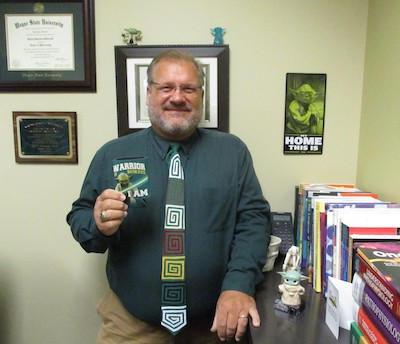
Decades later, once he had three Wayne State University degrees under his belt, Pokorski returned to the hospital where he’d convalesced to look through his medical records with educated eyes. He was flabbergasted to see the doctor’s and social worker’s notes. “They thought I was faking it!” Pokorski said. “They called me a problematic, uncooperative child, when in fact I wasn’t responding because I had become totally deaf in my right ear, with 87% hearing loss on the left.”
That problematic, uncooperative child has gone on to serve as assistant clinical professor on both sides of the Eugene Applebaum College of Pharmacy and Health Sciences, teaching pathophysiology — the study of how disease or injury affects the body — to doctor of pharmacy students as well as health sciences students in physical therapy, occupational therapy, physician assistant studies and radiation therapy technology. It can be a tough course but WSU Applebaum students appreciate Pokorski, affectionately calling him Yoda because of his tendency to quote the Jedi master.
In addition to doing the work of two faculty members, Pokorski serves as the histopathology laboratory consultant for both the Macomb and St. Clair county medical examiner’s offices and is faculty advisor of Wayne State’s industrious Kappa Psi pharmaceutical fraternity.
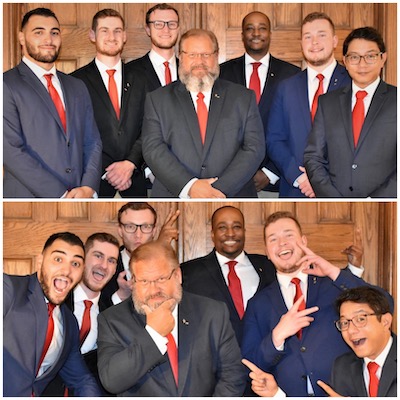
“Our Mu Omicron Pi chapter of Kappa Psi is blessed to have Dr. P,” said PharmD student Joseph Paul Javier, the chapter historian. “As a professor, he is extremely well-versed in his field and expects the highest quality work from his students. He wants us to be the best clinicians we can be and always makes himself available to talk about what he goes over in class. As a brother and faculty advisor for our Kappa Psi chapter, he is a wonderful mentor and an invaluable asset.”
“Luminous beings are we ...”
Pokorski’s success was never a given. In the early 1970s, hearing impaired students were labeled as disabled and segregated into special education classrooms. Thanks to fortunate timing combined with his parents’ advocacy, Pokorski ended up being one of the first special needs students mainstreamed into a general education classroom in the Grosse Pointe Public School System.
When his family later moved to Rochester Hills, one accommodation the Oakland County intermediate school district made available to Pokorski was hearing assistive technology — a wireless FM microphone that transmitted the teacher’s voice directly into Pokorski’s hearing aid. Comprehending what his classmates heard without having to rely solely on reading lips meant Pokorski was academically successful enough to catch the attention of Wayne State University Honors College recruiters.
During his senior year at Rochester Adams High School, Pokorski attended a special luncheon for disabled students and scientists at the American Association for the Advancement of Sciences national meeting in Detroit. “The director of Wayne State’s Student Disability Services [SDS] approached me at that event and told me that if I came to WSU, they’d continue what Oakland County had started,” Pokorski said. “She assured me that Wayne State professors would be outfitted with FM microphones and would be understanding of my needs.”
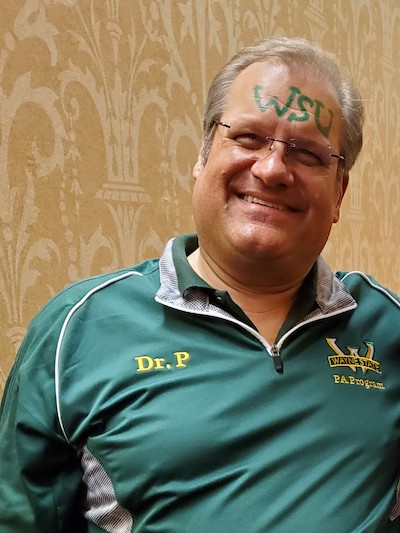
So even though he yearned to move farther from home, Pokorski enrolled at Wayne State as a chemistry major. “I had to adjust from high school to college like anyone else but with the added challenge of not hearing everything my classmates could in larger classes,” he recalled. “In 1983, there were no PowerPoints beamed up on screens and no Canvas learning portals. Profs weren’t handing out their notes to students and my FM microphone would sometimes cut out. When that happened, I could read their lips — until they turned their backs to write on the chalkboard or shut off the lights to show lecture slides. But the WSU Department of Chemistry was always supportive of me.”
He ran into a roadblock, though, with his major’s foreign language requirement. “I told them I had enough trouble hearing and speaking English — how was I going to learn the required Russian, German or French?” he said. “I asked if I could substitute Latin because it’s a reading language, and I knew it would help me in medical school, which is where I thought I was headed at the time. SDS supported my proposed accommodation and the Department of Chemistry gave approval. SDS had my back then and throughout my entire academic career.”
To this day, SDS prides itself on removing barriers in academia to fulfill its mission of providing access and opportunities to Wayne State students with disabilities. Located in the David Adamany Undergraduate Library in the center of campus, SDS works with students to create individualized accommodation plans for full access and the ability to meet the rigorous requirements of university programs — often with state-of-the-art assistive technology that Pokorski would have appreciated in the ’80s, such as speech-to-text software.
“Through advocacy and support, we work to remove barriers and level the playing field,” said SDS Interim Director Cherise M. Frost. “Success stories like Dr. Pokorski’s make us proud to have contributed to the journey of another Warrior making waves in the world.”
“Your path you must decide ...”
After earning his bachelor of science in 1987, Pokorski began working toward a PhD in pathology at Wayne State’s School of Medicine. At that time, the PhD in pathology courses often were combined with the 200-plus MD students’ classes. He found himself struggling with access to the content materials in large Scott Hall lecture rooms, where there was interference with his FM mic and professors needed to turn off the lights to show medical slides, removing any chance he had at reading their lips as they spoke.
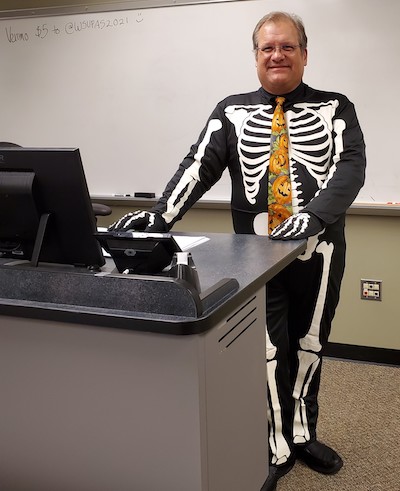
“Medical students were entitled to transcriptionist services, but I was told that as a PhD student, it was an unauthorized resource.” he said, adding that his PhD research advisor was not entirely supportive of him in the program. So, after struggling through four years of PhD pathology coursework, he pivoted to a master’s in medical sciences with a major in pathology, then moved from the School of Medicine to enroll in a second PhD program at WSU Applebaum. He immediately felt at home.
With support, focus and understanding from Professor Joel G. Pounds, who became a true and trusted mentor, Pokorski went on to earn a PhD in pharmaceutical sciences, specializing in toxicology. He then spent two years as a postdoctoral associate at the former Wayne State Institute of Chemical Toxicology, serving under Pounds for the first year.
During his junior year of undergrad, Pokorski began shadowing at the medical examiner’s at the Wayne County Morgue. Eventually, he earned a job and began rising through the ranks. He now serves as a forensic histopathologist laboratory consultant for the medical examiner’s offices in Macomb County, where he’s been since 1988, and in St. Clair County, since 2006. That work carries over to the classroom, where Pokorski uses his hands-on experiences as case studies to illustrate real world pathology presented in his pathophysiology lectures.
“When it comes to caring for students — their learning and their success — Phil Pokorski ranks at the top,” said WSU Applebaum Associate Dean for Health Sciences Peter Frade, PhD. “He particularly enjoys working with students individually, a notable endeavor considering the enormous number of students under his watch in both pharmacy and the health sciences. Kind, sensitive and caring are three words I would use to describe Phil's attitude. He is in a class by himself!”
“Always in motion is the future ...”
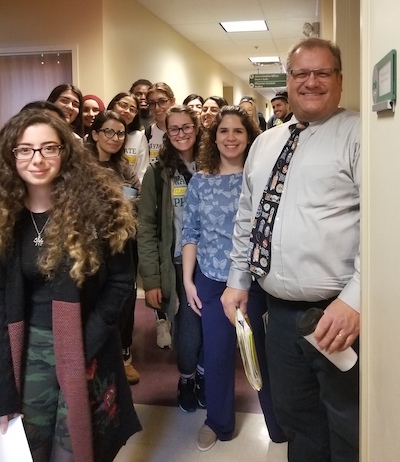
At the start of each semester, Pokorski is upfront about his hearing impairment. “Students may notice right away that I sound a little different and wonder where I’m from. I tell them I was born and raised in Michigan — I drink Vernors and call it pop! — but some still say I have a slight ‘deaf’ accent,” Pokorski said. “I let students know I can hear sounds. In fact, I love listening to music, played clarinet for years, and still study classical music and play piano. But, I warn my students that I won’t hear them if they are down the hall calling my name, or if they’re whispering to me in class.”
Over the past 15 years of teaching at WSU Applebaum, Pokorski has learned strategies for successful campus interactions. When a student raises their hand with a question during lecture, he walks toward them before calling their name so he can read their lips. He sits in the front row at faculty meetings. But all of his strategies flew out the window when the coronavirus closed Wayne State’s buildings in March 2020 and classes went online.
“I’m not one of those professors who gives a couple lectures a semester,” he said. “I lecture for close to 300 hours every academic year. And once we switched to Zoom, everything changed.”
In the early days of the pandemic, Zoom didn’t have free captioning. The other option, Microsoft Teams, had captions, but when there was slow WiFi caused by a high number of participants, low bandwidth or thunderstorms, for example, live feeds and captioning were affected. Pokorski was frustrated by the ways virtual classes limited his ability to communicate with students.
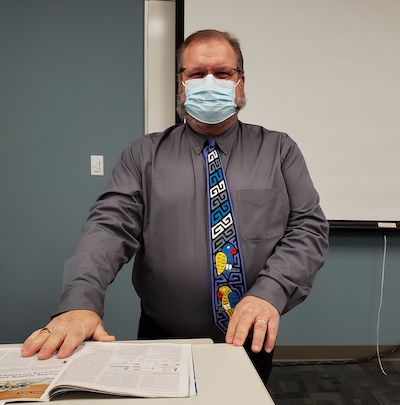
So, using the same PowerPoint notes he would have used on campus, Pokorski recorded lecture after lecture from his home office on Echo360 and uploaded each one to the Canvas learning portal. Then, students had 24/7 access to all of his lectures, with the ability to pause the video and take notes or rewatch portions as needed.
“That was a lot of work and it paid off, but something was really missing,” Pokorski said. “I’m a very animated professor in the classroom and I felt like my lack of interaction with students was becoming an issue.”
To engage with students from afar, Pokorski launched “Live Chats with Dr. P” — office hours on Zoom where the chat function takes center stage. “Students seem to prefer chat or texting,” he said. “The whole concept of active learning is that you’re supposed to have discussions on content, but that doesn’t work for me in an auditorium setting. Small-group discussion via chat is still active learning — they type in their questions, which I read live and then answer and discuss on camera. Students love it.”
“You must feel the Force around you”
Now that the 2021-22 academic year has begun, and the university has issued a COVID-19 vaccine mandate and extended mandatory masking through at least mid-October, Pokorski is looking ahead to the next set of challenges.
“When people are masked, I can’t read their lips,” Pokorski said. “All my colleagues are phenomenal, but unlike someone in a wheelchair, my hearing loss isn’t easy to ‘see,’ so they don’t always remember that they shouldn’t pick up the phone and call me, especially if I don’t have any idea of the subject matter. If I know we’re going to be talking about lung disorders, for example, I can formulate the types of questions I might be asked. Additionally, when we returned to campus this month, some had forgotten that when we are masked during random passing-by chats in hallways or lecture rooms, I cannot hear any words or read their lips.
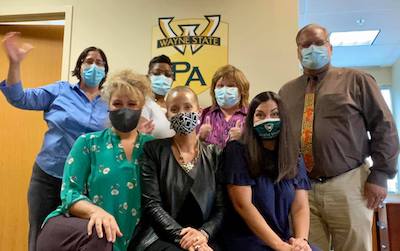
“My audiologist, who is a close friend of mine, recently started crying during my hearing-to-speech exam. She put her hand over her lips to speak a list of 40 words, which I was supposed to repeat. I only got 12 of them right.”
Even so, Pokorski is determined to find a way to make on-campus teaching with pandemic mandates successful, saying, “I care so much about our students, and I only saw a few in person over the past year of the pandemic.”
Lecturing live is ideal but he’s grateful to now have a repository of recorded lectures as backup. “The pandemic sort of solved the issue of snow days,” he said. “Now we’ll never have to cancel class again!”
That’s fine with students like Javier and his Kappa Psi brothers, who can’t seem to get enough of their advisor. “He keeps us informed about what’s happening in the program and is always a source of encouragement when it comes to the chapter’s various philanthropy and professional programs,” Javier said. “An excellent professor, mentor and brother — Dr. Pokorski is all these things and more.”
WSU Applebaum information meetings for prospective students take place at 6 p.m. on the first Tuesday of each month.
An anchor in urban health care
The Eugene Applebaum College of Pharmacy and Health Sciences is built on more than 100 years of tradition and innovation in the heart of Detroit. We have grown deep roots in our city, harnessing its powerhouse hospital systems and community service organizations as vibrant, real-world training grounds for students, with an ongoing focus on social justice in health care. And our research at all levels — from undergraduates to veteran faculty members — translates into creative solutions for healthier communities.
Wayne State University is a premier urban research institution offering approximately 350 academic programs through 13 schools and colleges to more than 26,000 students.
